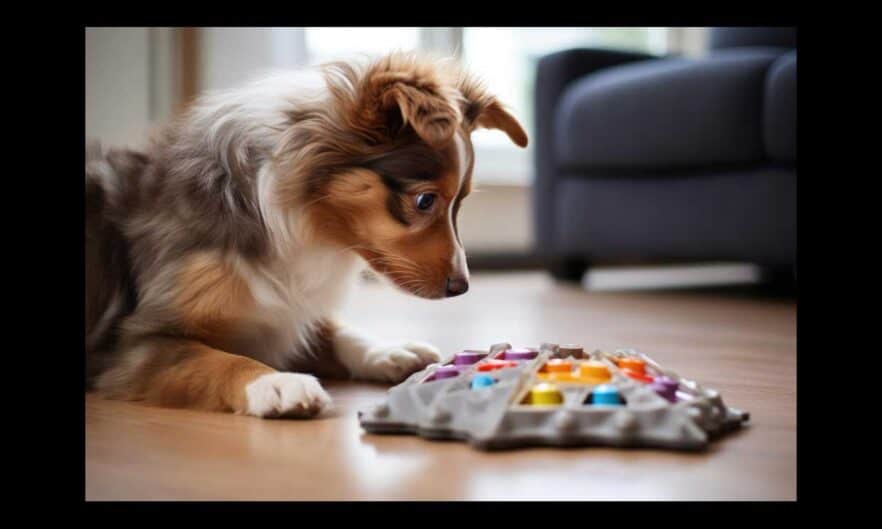Puzzle toys are becoming an increasingly popular way to provide dogs with mental stimulation and enrichment. Rather than just providing a regular chew toy, puzzle toys integrate physical and cognitive challenges that dogs must solve. The rewards and satisfaction of “winning” these puzzles offer many mental health benefits for our canine companions.
The Importance of Mental Stimulation for Dogs
Dogs thrive when they have activities that engage their body and mind. Without adequate mental stimulation, dogs can become bored, and frustrated and develop problematic behaviors. Puzzle toys provide an outlet for their natural intelligence and instincts in a positive way, making them some of the best puzzle toys for dogs.
These toys challenge dogs to problem-solve, work for their treats, and stay mentally sharp, all while having fun. Investing in high-quality puzzle toys can greatly enrich your dog’s life and help prevent behavioral issues caused by boredom and under-stimulation.
Preventing Boredom
Dogs need more than just physical activity such as walks, play, and training. Leaving a dog alone all day without mental stimulation can lead to boredom. This pent-up energy and lack of stimulation may cause them to develop destructive tendencies and bad habits. Puzzle toys give their mind a job to do.
Satisfying Natural Instincts
Many dogs, especially working breeds, have strong natural instincts to hunt, forage, and problem-solve. Puzzle toys allow an appropriate and safe way for dogs to tap into these innate skills. The challenges satisfy their instinctual needs for mental engagement and reward.
Avoiding Frustration & Anxieties
Insufficient mental stimulation can frustrate intelligent dogs. It may also contribute to separation anxiety in dogs left alone for long periods. Puzzle toys distract from anxieties and fulfill their needs to learn, explore, and be rewarded. This promotes relaxation and contentment.
Preventing Obsessive Behaviors
Sometimes dogs start obsessional behaviors like excessive licking or chewing out of boredom and stress. Puzzle toys provide a puzzle obsession instead, delivering a sense of accomplishment. It gives their minds something constructive to focus on.
Types of Puzzle Toys
There are many types of interactive puzzle toys specially designed to challenge a dog’s brain and reward their problem-solving success.
Food Puzzles
These toys require dogs to move pieces around strategically to get treats out of compartments. Food puzzles encourage mental agility and natural foraging skills. Adjustable levels let you increase the challenge as your dog learns.
Chew Puzzles
Chew toys with slots, compartments, or shapes for treats turn chewing into a game for dogs. Dogs must manipulate the toy to access the snacks. This makes the reward part of a problem-solving process.
Nosework Puzzles
These toys hide treats under lids, panels and cardboard flaps. Your dog uses their powerful nose to sniff out the food rewards. This taps into their natural scent-tracking abilities for both mental and physical enrichment.
Interactive Puzzles
Electronic puzzle games require your dog to perform a skilled action like pressing a button or sliding a lever to release treats. More advanced versions deliver varied challenges and settings to constantly engage your dog’s mind.

Benefits of Puzzle Toys for Dogs
Using puzzle toys provides many enriching mental health benefits for dogs.
Increased Mental Stimulation
The primary benefit of any puzzle toy is increased mental stimulation. Dogs get to put their problem-solving intelligence and instincts to work in a rewarding way. A puzzle engages the mind through motivation and challenge.
Improved Cognitive Functions
Just like the brain of a human, a dog’s brain needs regular exercise to stay healthy. Puzzle toys provide this cognitive enrichment. Using puzzle exercises, areas of the brain responsible for learning, logic, and problem-solving to keep the mind fit.
Slowed Cognitive Decline
For aging dogs, research indicates that continued mental stimulation may help delay senility and cognitive decline associated with conditions like canine cognitive dysfunction. Keeping the brain active with puzzles may preserve mental faculties.
Reduced Boredom & Frustration
Dogs that become bored or under-stimulated often develop destructive habits or obsessive behaviors. Puzzle toys provide an outlet for mental energy and fulfill innate needs to problem-solve and forage as they would in the wild. This reduces boredom.
Increased Confidence & Independence
As dogs overcome puzzle challenges, it builds their confidence and feelings of accomplishment. Solving puzzles on their own also promotes independence. These boosts in self-assurance and autonomy are beneficial for mental health.
Improved Adaptability & Resilience
Exposure to frequent new challenges through varying puzzle toys may help improve a dog’s adaptability and resilience. They learn to face new situations and reward their persistence in solving problems, beneficial traits for well-being.
Bonding & Enrichment Opportunities
Interactive puzzle play provides natural opportunities for dogs to bond with human guardians. Solving puzzles together meets their social needs while providing mutual enrichment through play.
Overall Calmness & Contentment
A mentally stimulated dog is a calm, content dog. When their needs for engagement are met, dogs become less stressed or anxious. Puzzles focus their energy and instincts in the right direction and provide an emotional outlet.
Potential Reduction of Problem Behaviors
Many problematic dog behaviors result from lack of stimulation and boredom. Puzzle toys divert dogs’ energy into positive pursuits and satisfy their needs. Providing this outlet could mean fewer unwanted behaviors like destruction, chewing, hyperactivity and aggression.
Choosing Puzzle Toys
With so many types of dog puzzle toys available, it helps to consider a few factors when choosing the right interactive puzzles for your pooch.
Difficulty Level
Match the puzzle challenge to your dog’s skill level. Level 1 puzzles for beginners have simple challenges, while advanced levels require complex thinking. Start easy to build confidence and work up.
Interests & Instincts
Play to your dog’s strengths. If they love sniffing, try a scent puzzle. If they like to chew, choose a chew toy puzzle. Match puzzles to their interests to maximize engagement.
Size of Dog
Make sure puzzles and their pieces or compartments are sized appropriately so your dog can interact with them, based on the breed’s mouth and paw dexterity.
Safety
Only choose nontoxic puzzles made of dog-safe materials in case of chewing. Monitor use to avoid choking hazards on small pieces or treats.
Food Motivation
Some dogs are more food-motivated than others. Highly food-driven dogs get the most enrichment from puzzles involving treats. Use praise or toys for less food-focused dogs.
Energy Level
High-energy working breeds tend to thrive with more challenging puzzles requiring vigorous physical and mental engagement. Low-energy dogs may prefer simpler puzzles.

Making Puzzle Play Positive
Adding puzzle toys should enrich your dog’s life, not cause anxiety. Here are some tips for a positive and rewarding puzzle play experience:
- Guide your dog and set them up for success on early attempts. Praise small accomplishments.
- If your dog gets frustrated, simplify the puzzle or show them how it works to rebuild confidence.
- Increase difficulty gradually at an appropriate pace for your dog’s abilities to prevent discouragement.
- Make sure your dog has access to treats or rewards at their skill level to motivate continued play.
- Keep puzzle sessions short, around 5–10 minutes. Stop before your dog gets bored or gives up. Quit on a positive note.
- Rotate through different types of puzzle toys to keep things interesting and introduce new challenges.
- Store puzzles out of reach between play sessions, so your dog doesn’t get bored with constant access.
- Make sure your dog has adequate physical and social activity in addition to mental stimulation.
Conclusion
In conclusion, interactive puzzle toys provide invaluable cognitive and instinctual enrichment for dogs. By positively tapping into their natural behaviors, puzzles stimulate your dog’s mind, reduce boredom and behavior problems, and improve their overall mental health and well-being. Puzzle play strengthens your bond while keeping your dog mentally fit. Consider adding these engaging toys to your dog’s routine for their happiness and enrichment.
Jacob Kay, Veterinary Advisor & Editor
Jacob Kay is a dedicated Veterinary Advisor and Editor with a passion for animal welfare and healthcare. With a profound understanding of veterinary medicine and a commitment to promoting the well-being of pets, Jacob has dedicated his career to providing valuable insights and guidance to pet owners and veterinary professionals alike. His advocacy for responsible pet ownership and his dedication to ensuring the health and happiness of dogs align perfectly with the ethos of wewantdogs.
https://www.wewantdogs.co.uk/















